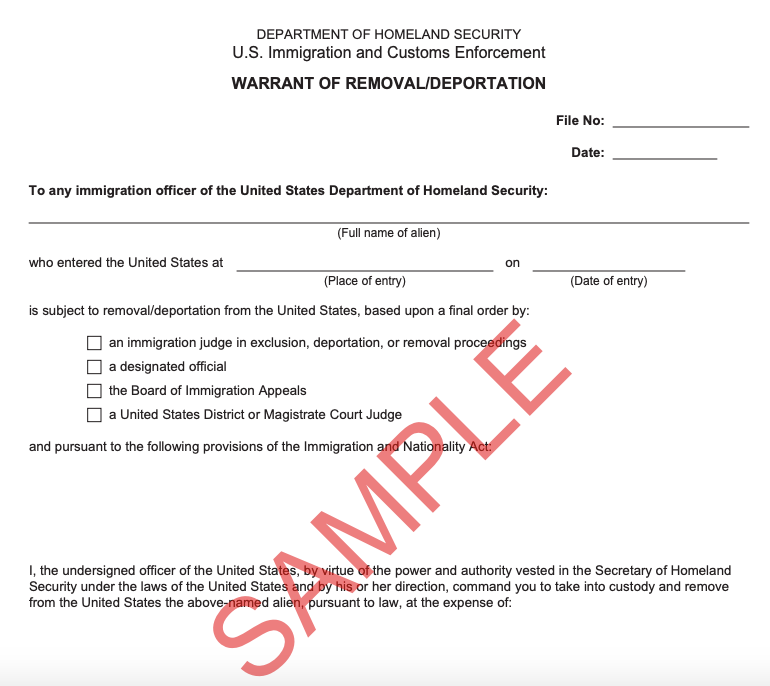Many immigrants and undocumented aliens living in the United States, regardless of the legality of their situation, are afraid of being picked up by ICE.
After all, ICE is the public face of the deportation process, and numerous news stories have cropped up over the years regarding their less-than-legal enforcement of U.S. immigration law.
Further, unlike the police, ICE does not necessarily have to tell you your rights, and may mislead you in an attempt to get you to talk.
In this guide we'll outline the basics of what you need to know in case you're arrested by ICE.
However, please keep in mind that the best and only advice anyone can give you in such a situation is to get in touch with an attorney immediately.
Immigration and Customs Enforcement (ICE) Basics

A screenshot of ICE's main website, taken on March 20th, 2020.
Put simply, U.S. Immigration and Customs Enforcement (ICE) serves as the principal investigative agency of the U.S. Department of Homeland Security (DHS).
In this role, they generally investigate crimes that are related to immigration, customs, and border control.
Further, ICE's self-stated mission is to "protect America from the cross-border crime and illegal immigration that threaten national security and public safety."
Under the authority of laws such as the Immigration and Nationality Act, as well as a hefty amount of case law, ICE agents may arrest immigrants when they have a warrant for the arrest of that particular individual, or if they have probable cause that an immigrant entered the country illegally.
We'll outline the basics of the arrest process below, but please keep in mind that this article (and in fact most articles you will find online) only provides a broad overview of the process.
Always refer to the advice of your attorney for situations involving an actual case.
The Arrest Process

You can find a full sample copy on ICE's website here: https://www.ice.gov/sites/default/files/documents/Document/2017/I-205_SAMPLE.PDF
As we noted above, ICE can only arrest immigrants in two situations:
- When they posses a "warrant" for the immigrant's arrest, specifically Form I-205, Warrant of Removal/Deportation (as shown above).
- When they possess a "reasonable suspicion" that the immigrant (1) is not a U.S. citizen, (2) entered the country illegally, and (3) is likely to flee before ICE can obtain a warrant.
For this reason, the actual procedures surrounding the arrest (and later detention) are important, as they could have a profound impact on the outcome of your case.
As a very brief overview of the process:
- The Arrest – There are two situations where you may be arrested by ICE. First, ICE could arrest you directly (as we just described above). Second, in the event that an undocumented alien is arrested by the police, ICE may issue a "detainer," which basically asks the local law enforcement agency to hold on to the arrested individual until ICE can come and arrest them for the immigration violation.
- Removal Proceedings – After the arrest, the ICE agent will determine whether or not to place the individual in removal proceedings and, if so, what charges to bring against them ("overstayed visa," "entered illegally," "otherwise inadmissible," etc...). Then, ICE has 72 hours to issue a "Notice to Appear." As you can probably expect from the name, this document is, essentially, an order that you appear in a particular immigration court on a particular date to fight the charges against you.
- Immigration Detention – After you're taken in by ICE and issued a Notice to Appear, you will likely be placed into a holding facility pending further processing. At this point you will likely be given the option of making one local phone call. It is highly recommended that you call an attorney at this point. If you do not already know of an attorney, you can call your family and ask them to find an attorney for you (as detailed later in this article).
- Immigration Bond – In some situations, you may be eligible for an immigration bond. Similar to the normal form of bond common in criminal courts, this is basically a sum of money you can pay to be released from custody while your case is pending.
Note, however, that this is simply a broad overview of the process. Always speak with an attorney for more specific recommendations about your case.
Know Your Rights During and After an ICE Arrest

Everyone living in the United States, regardless of their skin color or immigration status, has certain rights under the U.S. Constitution.
In the event that you are arrested by law enforcement (and especially if you are arrested by ICE), you should take steps to exercise these rights as a way to protect yourself from unfair or unlawful treatment.
You have the Right to Remain Silent
In the event that you are arrested by ICE or detained by law enforcement pending an ICE arrest, the best possible advice you can follow is to remain silent.
However, keep in mind that "you have the right to remain silent" doesn't quite mean what most people think it means.
For example, in most cases, you should exercise your right to remain silent as a way to avoid incriminating yourself when you're being questioned by law enforcement.
However, this doesn't bar you from saying other things, especially if you feel uncomfortable about the arrest or the officer's actions.
As a few common statements you should use (that we will outline in a bit more detail below):
- "I would like to exercise my right to remain silent. I will not answer any further questions about my case."
- "I would like to contact my attorney." Or, alternatively, "I would like to contact my family so they can find me an attorney."
- "I refuse to consent to a search of my person or belongings."
Remember, talking to an ICE agent or other law enforcement officer about your case or your immigration status will only hurt your chances in immigration court.
It's usually wise to remain silent about your situation, while at the same time taking steps to assert your rights or needs to the officers.
You have the Right to Speak with an Attorney
It's very important for you to understand that the government will not appoint an attorney for you if you fail to find one yourself.
Instead, as outlined in the Immigration and Nationality Act (INA):
“In any removal proceedings before an immigration judge, and in any appeal proceedings before the Attorney General from any such removal proceedings, the person concerned shall have the privilege of being represented (at no expense to the Government) by such counsel, authorized to practice in such proceedings, as he shall choose.”
8 U.S.C. § 1362: Right to Counsel
Put simply, you have the right to be represented by counsel (an attorney), but the government will not provide you an attorney at its own expense.
This means that you must hire an attorney on your own, or risk having no representation at all in your case.
Often, the best course of action is to contact your family and have them search out an attorney on your behalf.
However, please remember that the immigration attorney must have additional information about your case before they can properly represent you.
At a bare minimum, your family should provide all of the following to the attorney:
- Your Alien number, or A number, which is a number issued to you shortly after your arrest the government uses to identify you
- The circumstances surrounding your arrest and/or incarceration
- An overview of your basic immigration history
- Any documentation related to your immigration history, arrest, and incarceration.
Once they receive these documents, your attorney can begin the deportation defense process.
You have Protections Against Unlawful Search and Seizure
Under the U.S. Constitution, law enforcement may only search your person or belongings if they possess a judicially signed warrant that specifically describes (1) the location to be searched, and (2) what the police are looking for.
Often, ICE will arrest individuals using Form I-205, Warrant of Removal Deportation, which gives them the authority to take an undocumented alien into custody.
However, it's important to note that Form I-205 is not a judicially signed warrant.
For this reason, it does not give ICE permission to search your person or belongings.
Put another way, unless the agent has your explicit (or, in some cases, implied) permission, they cannot search through your pockets, your home, your car, or any of your other possessions or private storage locations.
At most, the agents may pat down your body if they suspect that you are carrying a weapon.
Aside from that, you should never give the agents permission to search your person or belongings.
You have the Right to a Hearing in Front of an Immigration Judge
On paper at least, ICE cannot deport undocumented aliens without due process.
Generally speaking, this means that undocumented aliens must appear in front of an immigration judge who will decide whether or not to deport the individual.
However, unlike in a normal civil or criminal proceeding, immigration judges (and immigration courts) follow a distinctly separate list of rules and procedures.
For example, denial rates can vary considerably from court to court due to differences in how each judge interprets the often-conflicting rules, guidelines, and laws involved in the deportation process.
Further, a surprising number of individuals who are up for deportation (i.e. who are "in removal proceedings") are actually eligible to stay in the country through one or more of the common defensive immigration options.
Usually, this means applying for defensive asylum or applying for legal status through a relationship with a U.S. citizen or permanent resident family member.
However, there are often a variety of paths that you can consider when fighting in immigration court.
For this reason, it's wise to speak with an immigration attorney as soon as possible after your arrest.
Not only can an attorney help get you out of detention as fast as possible, they can also help you plan your defense in a way that gives you the best possible chance of success.
If You Are Being Held by Local Law Enforcement, You have the Right to be Released Within 48 Hours
The term "sanctuary city" has appeared in the news a lot over the past several years.
However, many people seem to misunderstand exactly what this term means in the context of immigration law.
Put simply, in the event that an undocumented alien is arrested by local or state police for an unrelated crime, ICE may ask that the police detain the individual for no more than 48 hours after they would otherwise be released so that an immigration agent can come down to the jail to arrest them for entering the country illegally.
A growing legal consensus has determined that honoring such an ICE hold request violates an alien's constitutional rights. On occasion, ICE agents don't show up for days or weeks after the detainer was issued, leading to additional harm.
Under these circumstances, the police forces in "sanctuary cities" are essentially saying to ICE "no, we will not unlawfully detain aliens just because it makes your job easier" and will instead release an individual subject to an ICE hold when they would normally be released.
Essentially, the real definition of a sanctuary city is a location that does not honor ICE detainers due to their inherently unconstitutional nature.
In this way, it's often smart for undocumented aliens who are who are arrested for unrelated matters (such as a speeding violation, or multiple instances of driving without a license) to keep track of how long they've been in custody.
This is because even in non-sanctuary cities it is illegal for the police to hold you for more than 48 hours after the issuance of an ICE detainer following your arrest.
What to Do After an ICE Arrest

Individuals who are arrested by ICE can face very different circumstances depending on where, why, and how they were picked up.
For example, individuals who are detained at the border or at airports will face different hardships than those who are picked up in ICE raids or held on ICE detainers.
Generally speaking, however, there are several practical tips that arrested individuals can follow to help their chances of receiving a favorable outcome in their case.
1) Remain Silent and Call Your Family
As we noted above, ICE will (usually) only arrest people when they have sufficient evidence to prove that the individual was in the country illegally.
For this reason, it is never in your best interests to speak with ICE about your case (or anything else for that matter).
Since ICE will use any information you give up against you, your best course of action is to call your attorney and to remain silent until they show up.
If you don't already have an attorney, you should call your family so they can find an attorney for you.
As we noted above, your attorney will need certain information to argue for your release, so be prepared with all of the information you have when you pick up the pohne.
Make sure to also pass on any details you picked up about your location or your case, such as where you're being held and the events of your arrest.
2) Never Provide False Documents or Lie
Lying in any legal situation is bad and will only hurt you in the future.
This includes providing false documentation or any other attempt to mislead ICE or other law enforcement agents.
Remember, like most law enforcement agencies ICE uses massive databases to keep track of every piece of information they have on foreign or unlawful residents.
If you provide information that conflicts with the data they have in the system, it will only become harder to get you released in the future.
Instead of lying, simply assert your right to remain silent until your attorney arrives.
3) Do Not Consent to a Search of Your Person, Do Not Share Any Additional Information
In a similar fashion, you should not consent to any search of your person or possessions.
Unless ICE has a judicial warrant (as described above) they have no right to search you or your possessions.
For this. reason, you should explicitly refuse to consent to such searches, as they can only harm or further complicate your case.
Don't hand over your consular documents, your green card, your passport, your driver's license, or any other identifying information.
If the officers say they have a warrant, ask to see it before you let them search your things.
Similarly, don't tell them where you were born, how you entered the United States, and don't talk about your legal status in any way, shape, or form.
In fact, try not to answer any questions at all. At most, you should tell them your name for identification purposes.
After that, simply repeat the statements we outlined above ("I want to speak to an attorney," I refuse to consent to a search of my belongings," etc...) until your attorney arrives.
4) Consult with an Attorney Before Signing Any Documents
In some cases the ICE agent will hand you documents to sign regarding your case.
In almost every situation it is a terrible idea to sign these documents without first reading them over with your attorney.
For example, you might accidentally waive your right to a hearing or ask for a "voluntary departure" by signing legal documents that you simply don't understand.
If an ICE agent hands you anything to sign, you should simply refuse to do anything with it until you speak with your lawyer.
Conclusion

As with any other interaction with ICE, there are a few key things you should remember in the event that you're arrested by ICE:
- Remain calm and don't resist during the arrest.
- Never lie to the agents or provide false documents.
- Exercise your right to remain silent.
- Never consent to a search of your person, and make sure to read any and all warrants.
- Get in touch with an attorney immediately, either by calling directly or by asking your family members to find one for you.
By following these five general tips (as well as other advice from your attorney), you can protect your interests and, hopefully, get released from custody in a timely manner.
While no immigration case is a sure-thing, it's always in your best interests to hire an attorney and remain silent.
Remember, only an attorney can provide the critical, time-sensitive information you need to properly defend yourself after an ICE arrest.

